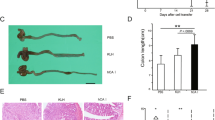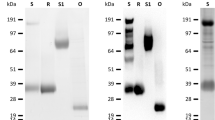Abstract
ABSTRACT: We established an experimental animal model of the gastrointestinal colonization and systemic disease following oral challenge of type III group B streptococcal strain in 3-day-old newborn rats. Two type III group B streptococcal strains isolated from the cerebrospinal fluid of septic newborn infants produced colonization in 57-87% of the challenged animals and 13-31% of these colonized animals developed systemic disease. Using this new animal model, we evaluated the effect of orally administered human immune serum globulin on the colonization and systemic disease. This antiserum contained 21 μg/ml of type III group B streptococcal antibody of human IgG class. Animals fed with immune serum globulin developed significantly lower rates of colonization and systemic disease than those of control (albumin or saline) (23 versus 71%,p < 0.001 for colonization; 7 versus 31%, p < 0.05 for systemic disease). However, rates of the development of systemic disease among the colonized animals were not significantly different between the two groups (33 versus 43%, p > 0.1). These findings suggest that orally administered immune serum globulin is beneficial in the prevention of colonization and systemic disease in this rat model and that this protective effect of oral immune serum globulin occurs primarily at the mucosal level
Similar content being viewed by others
Log in or create a free account to read this content
Gain free access to this article, as well as selected content from this journal and more on nature.com
or
Author information
Authors and Affiliations
Rights and permissions
About this article
Cite this article
Kim, K., Dunn, K., McGeary, S. et al. Efficacy of Orally Administered Immune Serum Globulin against Type III Group B Streptococcal Colonization and Systemic Disease in an Infant Rat Model. Pediatr Res 18, 1329–1331 (1984). https://doi.org/10.1203/00006450-198412000-00022
Received:
Accepted:
Issue date:
DOI: https://doi.org/10.1203/00006450-198412000-00022
This article is cited by
-
A preparation from bovine colostrum in the treatment of HIV-positive patients with chronic diarrhea
The Clinical Investigator (1993)



